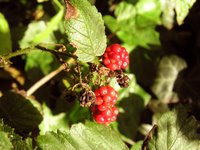
The following report was sent to me by Mary Nassimbeni, Centre for Information Literacy, University of Cape Town, mnassimbeni@ched.uct.ac.za. It is based on a report by Francois Hendrikz, Director of the Mpumalanga Provincial Library Service who initiated the project. You can also download this entry:
http://dis.shef.ac.uk/sheila/witbank.pdf (Photo by Sheila Webber: Dahlia, Blackheath, Nov 2006)
Information Literacy Campaign in Public Libraries in Mpumalanga Province of South AfricaIntroduction: The Mpumalanga Library and Information Service in collaboration with the University of Cape Town’s Centre for Information Literacy presented the first of three planned information literacy (IL) workshops from 27 until 30 June 2006. The workshops are part of a pilot information literacy campaign made possible with the funding from UNESCO’s Information for All Programme. This campaign is the first of its kind in Mpumalanga (and probably South Africa) where public librarians are being given the opportunity to develop their information literacy skills and to apply them in their libraries. From the response received from the participants is it clear that the campaign will contribute toward skills development and a better understanding of the challenges faced by public librarians in the field of information literacy.
Project goal: The overall goal of the project is to raise awareness of information literacy in the public library service and to establish, in the first instance the necessary skills of 30 public librarians in Mpumalanga so that they may improve their service delivery and raise the profile of the public library by enskilling library users in a variety of information literacy interventions.
Project objectives: 1. To introduce the theoretical concept of IL to the Project participants.
2. To provide them with the opportunity of designing a practical information literacy campaign for their library during the introductory workshops.
3. To allow them to implement their information literacy campaigns in at least 15 libraries over a three month period.
4. To provide the opportunity for participants of the Project to learn from each other’s practical experience through sharing their experiences and lessons learnt during a follow-up workshop after a 3-month period.
5. To measure the impact of information literacy campaigns in the libraries through library user feedback and through monitoring visits by officials from the Provincial Library Service.
6. To identify best practice and spread the lessons learned to other libraries in the province.
To address the above goal and objectives the introductory training workshop was held between 27 and 30 June 2006.
Purpose of the introductory workshop: The workshop was designed to provide an opportunity for gaining an understanding of the role and potential of information literacy education in public libraries. Its specific focus was on how to plan for and implement an information literacy campaign in a number of selected public libraries in Mpumalanga. It introduced participants to information literacy and information literacy education with specific reference to the contribution that public libraries can make to their users and potential users (e.g. school learners) and their effective use of information
Proccedings of the workshop: 1. The workshop was presented by Associate Professor Karin de Jager and Associate Professor Mary Nassimbeni from the University of Cape Town’s Centre for Information Literacy
2. The 28 participants included 21 public librarians from ten Municipalities and one Department of Correctional Services. Seven staff members from the Provincial Library Service also attended.
3. The presentation was a mix of theoretical input, discussion with participants, a visit to the local Public Library and practical hands-on exercises. It involved: Practical examples to illustrate IL programmes; Discussion with participants during brainstorming sessions to elicit ideas about possible campaigns; Group work to start designing an IL campaign; Participants’ learning from each other during discussion, planning and report back sessions; Learning materials and handouts made available to all participants.
Outcomes of the workshop: At the end of the workshop all participants:
Appreciated the value of IL education in a public library setting; Had a greater awareness of how IL relates to the work they already do in their library; Drafted an outline of an IL campaign that they would like to implement in their library; Received advice on to proceed with planning and implementation when they return to their library; Understood the guidelines of how to monitor and evaluate their campaigns.
Participants were given three months until September 2006 to refine their project plans and to start implementing their projects, during which time they received support from staff of the Provincial Library Service
Conclusion of the first phase: Evaluation of the workshop showed that it achieved the objectives of the first phase of the Project. All participants enjoyed the exposure to IL, new knowledge and the practical and interactive nature of the presentations. We are now ready to proceed with the next phase of the project, and hope to be able to report findings of our research in 2007.
 On Monday, in the "lecture" session of the Information Literacy class for 1st year Information Management students I had invited Alex Peng and Pam McKinney to respond to a few questions I had supplied to them earlier. Alex is a successful graduate of this course and is now studying for a PhD in the Department (an information management topic supervised by my colleague Dr Miguel Nunes). Pam has been mentioned on the blog before, as the information literacy expert in the Centre for Inquiry-based Learning in the Arts and Social Sciences. She graduated from our MSc IM course, and had a job at Sheffield Hallam University (the Other university in Sheffield) before joining CILASS. The questions I asked them were "How has being information literate helped you personally?", "Are you continuing to learn about information literacy & have your ideas about IL changed over time?" and "Have you any tips and favourite websites".
On Monday, in the "lecture" session of the Information Literacy class for 1st year Information Management students I had invited Alex Peng and Pam McKinney to respond to a few questions I had supplied to them earlier. Alex is a successful graduate of this course and is now studying for a PhD in the Department (an information management topic supervised by my colleague Dr Miguel Nunes). Pam has been mentioned on the blog before, as the information literacy expert in the Centre for Inquiry-based Learning in the Arts and Social Sciences. She graduated from our MSc IM course, and had a job at Sheffield Hallam University (the Other university in Sheffield) before joining CILASS. The questions I asked them were "How has being information literate helped you personally?", "Are you continuing to learn about information literacy & have your ideas about IL changed over time?" and "Have you any tips and favourite websites".
























